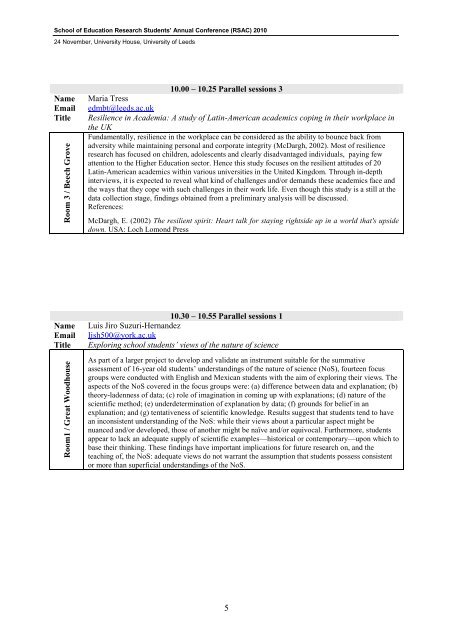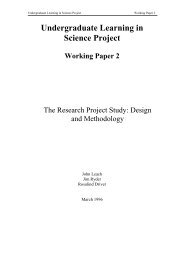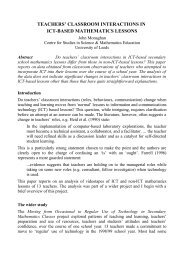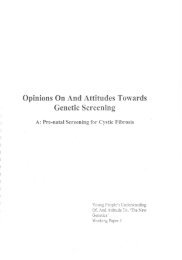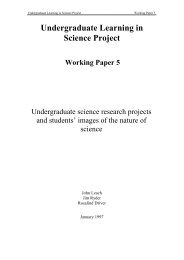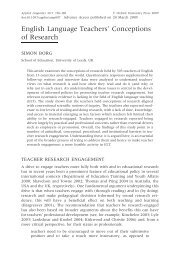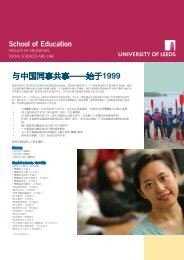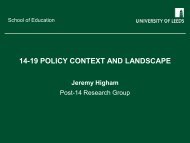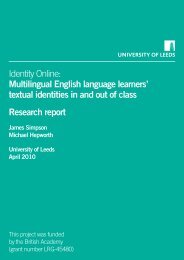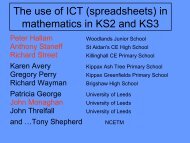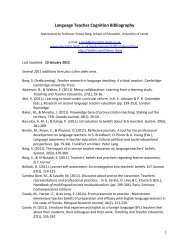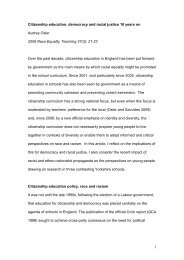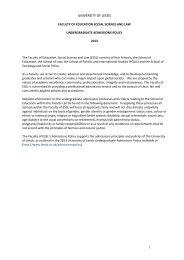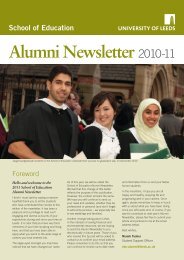Research Students' Annual Conference (RSAC) 2010 - School of ...
Research Students' Annual Conference (RSAC) 2010 - School of ...
Research Students' Annual Conference (RSAC) 2010 - School of ...
You also want an ePaper? Increase the reach of your titles
YUMPU automatically turns print PDFs into web optimized ePapers that Google loves.
Room1 / Great Woodhouse<br />
Room 3 / Beech Grove<br />
<strong>School</strong> <strong>of</strong> Education <strong>Research</strong> Students’ <strong>Annual</strong> <strong>Conference</strong> (<strong>RSAC</strong>) <strong>2010</strong><br />
24 November, University House, University <strong>of</strong> Leeds<br />
Name<br />
Email<br />
Title<br />
10.00 – 10.25 Parallel sessions 3<br />
Maria Tress<br />
edmbt@leeds.ac.uk<br />
Resilience in Academia: A study <strong>of</strong> Latin-American academics coping in their workplace in<br />
the UK<br />
Fundamentally, resilience in the workplace can be considered as the ability to bounce back from<br />
adversity while maintaining personal and corporate integrity (McDargh, 2002). Most <strong>of</strong> resilience<br />
research has focused on children, adolescents and clearly disadvantaged individuals, paying few<br />
attention to the Higher Education sector. Hence this study focuses on the resilient attitudes <strong>of</strong> 20<br />
Latin-American academics within various universities in the United Kingdom. Through in-depth<br />
interviews, it is expected to reveal what kind <strong>of</strong> challenges and/or demands these academics face and<br />
the ways that they cope with such challenges in their work life. Even though this study is a still at the<br />
data collection stage, findings obtained from a preliminary analysis will be discussed.<br />
References:<br />
McDargh, E. (2002) The resilient spirit: Heart talk for staying rightside up in a world that's upside<br />
down. USA: Loch Lomond Press<br />
Name<br />
Email<br />
Title<br />
10.30 – 10.55 Parallel sessions 1<br />
Luis Jiro Suzuri-Hernandez<br />
Ijsh500@york.ac.uk<br />
Exploring school students’ views <strong>of</strong> the nature <strong>of</strong> science<br />
As part <strong>of</strong> a larger project to develop and validate an instrument suitable for the summative<br />
assessment <strong>of</strong> 16-year old students‘ understandings <strong>of</strong> the nature <strong>of</strong> science (NoS), fourteen focus<br />
groups were conducted with English and Mexican students with the aim <strong>of</strong> exploring their views. The<br />
aspects <strong>of</strong> the NoS covered in the focus groups were: (a) difference between data and explanation; (b)<br />
theory-ladenness <strong>of</strong> data; (c) role <strong>of</strong> imagination in coming up with explanations; (d) nature <strong>of</strong> the<br />
scientific method; (e) underdetermination <strong>of</strong> explanation by data; (f) grounds for belief in an<br />
explanation; and (g) tentativeness <strong>of</strong> scientific knowledge. Results suggest that students tend to have<br />
an inconsistent understanding <strong>of</strong> the NoS: while their views about a particular aspect might be<br />
nuanced and/or developed, those <strong>of</strong> another might be naïve and/or equivocal. Furthermore, students<br />
appear to lack an adequate supply <strong>of</strong> scientific examples—historical or contemporary—upon which to<br />
base their thinking. These findings have important implications for future research on, and the<br />
teaching <strong>of</strong>, the NoS: adequate views do not warrant the assumption that students possess consistent<br />
or more than superficial understandings <strong>of</strong> the NoS.<br />
5


